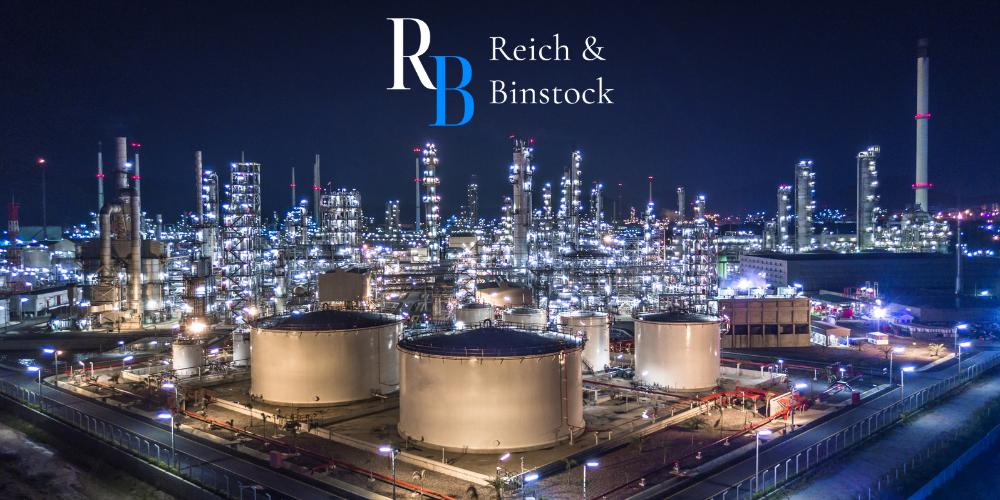HOUSTON EXPLOSION ACCIDENT LAWYER
PRACTICE AREAS
Houston Refinery Accident Lawyer

Explosions are often the result of combustible gasses or chemicals coming in contact with fire, electrical sparks, or high heat. Explosions in the work environment can occur in industrial environments, on construction sites, in vehicle accidents, or anywhere else combustible gasses or chemicals are stored. If you are a victim, please contact a Houston explosion accident lawyer with our firm today.
When explosion injuries such as chemical exposure and burn injuries are caused by negligence, victims may be able to recover significant compensation for past, present and future damages suffered as a result of injuries.
Family members of victims killed in explosions may be able to recover wrongful death benefits, which may include compensation for funeral expenses, medical expenses, loss of companionship, loss of income, and pain and suffering experienced by the deceased prior to death.
At Reich & Binstock, in Houston, we understand that it is rare for financial compensation to fully repair all sense of loss and to completely heal all wounds. However, securing the maximum compensation that you deserve for losses and damages can also help you cope with loss, traumatic memories and disfigurement.
It can help you avoid medical debt, bridge the gap until you can get back to work and provide financial stability for your future. If you or a loved one suffered explosion injuries in Houston, call our office today to schedule your free consultation with an experienced personal injury attorney at 713-622-7271.
Do I Need a Houston Explosion Accident Attorney?
The best way to ensure that your case is handled correctly is to speak with an explosion accident attorney in Houston. In the aftermath of an explosion, you’ll likely participate in a complete investigation of the incident. Most victims of these occurrences have no idea where to even begin with their cases.
They lack the resources and legal knowledge to determine liability in the case. Your explosion accident attorney has all the skills necessary to do exactly that, plus to gather the necessary evidence, calculate your damages, and negotiate a fair settlement for you.
Consider the Texas City refinery explosion back in March 2005. Without legal assistance, victims and their families likely would not have achieved what was the largest OSHA fine in its history at the time. Attorneys are crucial for recovering full and fair compensation for your injuries.
Don’t hesitate to reach out. Call the explosion and refinery accident attorneys at Reich & Binstock at 713-622-7271. You can also request a free consultation online.
How Can an Explosion Accident Attorney Help Your Case?
Explosion and refinery accident attorneys provide crucial support in explosion-related cases. Refinery explosions and other serious accidents can lead to complicated personal injury claims. For this reason, and for the following reasons, we strongly recommend getting an attorney.
- Legal Advice: They guide you through your rights and options.
- Investigation: They gather evidence, determine the cause, and identify responsible parties.
- Building Cases: They construct strong arguments to support compensation claims.
- Navigating Procedures: They handle legal complexities, paperwork, and court proceedings.
- Negotiations: They engage with insurers for fair settlements.
- Litigation Representation: They represent you in court if a settlement isn’t reached.
- Maximizing Compensation: They work to secure the maximum compensation possible.
- Support: They offer guidance and support throughout the process.
What Are the Different Levels of Injury Associated With an Explosion?
Explosions produce unique injuries that many people never see in their lifetimes. Examples of accidents that result in explosion injuries include steam explosions, chemical explosions, mining explosions, drilling explosions, fuel tank explosions, and much more. These injuries are specifically categorized into four sections, each with its own set of injuries that come from different aspects of a blast.
Who Is Liable for Explosion Accidents in Texas?
This is where cases of explosion injuries get tricky. The legal aspects of your case become complicated when there is no obvious party at fault for the explosion. In cases where the explosion happened in an industrial setting, many different parties could be liable for your injuries.
Explosion Injury Liability in Texas
Below, we discuss potential areas of liability for explosion injuries both in and out of the workplace:
Explosions in the Workplace
- Industrial property owners: Owners of the property have a responsibility to ensure that their property is safe for employees to perform their jobs. If they fail to do this, they could face a premises liability suit.
- The company itself: Whoever holds responsibility for the day-to-day operations of the workplace often has a duty of care to their employees. If they fail to meet appropriate safety standards, they may be liable for the explosion.
- Third-party contractors: These are commonly brought into industrial settings. If their standard of work does not meet OSHA’s standards and results in an accident, they are liable.
- Equipment manufacturers: Industrial workspaces often have many different types of expensive and complicated equipment. If a product defect results in explosion injuries, the manufacturer of the product may be liable.
Explosions Outside the Workplace
- Product manufacturers: Some products are, by nature, highly flammable or combustible. If these products do not receive the proper labeling by the manufacturer, they may be liable for injuries.
- Parts manufacturers: Vehicles these days have many small, specific parts. Some of these parts, if defective, could very well cause an explosion of the vehicle. In this case, the manufacturer of the part could be liable.
What Are Common Causes of Refinery and Explosion Accidents in Texas?
Refinery and explosion accidents in Texas can be caused by various factors, often stemming from the nature of the oil and gas industry and industrial processes. When these accidents happen, plant and refinery workers can suffer serious injuries. Some common causes include the following.
- Human Error: Mistakes made by workers due to inadequate training, fatigue, or negligence can result in accidents, including improper handling of equipment or failure to follow safety protocols.
- Chemical Releases: Mishandling or improper storage of hazardous chemicals can lead to leaks or releases, triggering explosions. Chemical reactions or spills are potential hazards in refineries.
- Ignition Sources: Sparks from welding, cutting, static electricity, or other sources can ignite flammable materials or vapors, causing explosions.
- Safety Protocol Violations: Ignoring or bypassing safety protocols and regulations in favor of expedited production or cost-cutting measures can lead to hazardous situations.
- Environmental Factors: Adverse weather conditions, natural disasters, or unexpected environmental changes can sometimes contribute to accidents.
The Fire Triangle in Explosions and Refinery Accidents
There are three elements that can act as triggers for plant and refinery explosions. These elements are oxygen, heat, and fuel. Because natural gas, other fuels, heat, and oxygen are often present at refineries, explosions and accidents are always a possibility.
Below, we outline the three elements of the fire triangle that can create and sustain fires and explosions.
Heat: Heat is the energy component that initiates the fire. It raises the temperature of a substance to its ignition point, where it begins to combust. Heat can be generated through various sources like sparks, flames, friction, electrical energy, or chemical reactions.
Fuel: Fuel refers to any substance that can burn. It can be solid, liquid, or gas. Common examples include wood, paper, gasoline, natural gas, plastics, and chemicals. For a fire to burn, there must be a combustible material present that can undergo oxidation or combustion.
Oxygen: Oxygen is an essential component that sustains combustion. It enables the chemical reaction of burning by combining with the fuel in a process called oxidation. Sufficient oxygen supply is necessary for a fire to continue burning. If the oxygen supply is limited, it can hinder or extinguish the fire.
Boiling Liquid Expanding Vapor Explosions (BLEVEs)
Boiling Liquid Expanding Vapor Explosions happen when liquids stored in sealed, pressurized vessels begin to boil. As the substance continues to boil and gets converted into gas, it will take up more room than its liquid form. Given enough time, the pressure can build and eventually rupture the vessel, producing an explosion.
An explosion accident victim of this type of explosion should contact our refinery accident lawyers right away.
Poor Equipment Maintenance and Employee Training
A plant or refinery accident can also occur due to poor maintenance practices and inadequate training for employees. Inadequate maintenance of refinery facilities, including pipelines, machinery, or safety systems, increases the risk of accidents. Insufficient training of employees or inadequate supervision can result in mistakes that lead to accidents.
Employee training must include education about the following, as per OSHA’s training requirements.
- Lockout/tagout procedures
- Emergency responses
- Chemical safety training
- Hot work
- Safe handling of hazardous substances
- Safe use of electrical equipment
- Using personal protective equipment (PPE)
Corrosion and Contaminated Chemicals
Additionally, industrial and refinery accidents can occur due to corrosion of equipment and contamination of chemicals. Although corrosion is a hazard often missed by safety inspectors, it is crucial to investigate and address the signs of corrosion as soon as they are discovered. Unchecked corrosion could allow combustible gasses or liquids to leak.
Plant and refinery workers also often use highly reactive chemicals in order to do their jobs. Because these chemicals are so reactive, it is crucial that they are stored and handled properly, as well as protected from contamination. Chemical contamination could lead to accidents and devastating injuries.
Combustible Dust and Other Hazards
Many different processes in many different industries have the tendency to produce dust particles. Unfortunately, many dust particles are highly combustible and can be dangerous if not addressed properly. If enough of the dust comes into contact with an ignition source, an explosion could occur.
Explosion victims who suffered injuries because of combustible dust deserve compensation for their injuries. We strongly urge you to contact our office if you were injured in a refinery or plant explosion.
OSHA Violations
The Occupational Safety and Health Administration exists to create and enforce safety regulations that protect workers. Unfortunately, many employers and companies fail to uphold state and federal safety regulations. When OSHA violations occur, injured industrial workers can file claims to recover compensation for those injuries.
What Damages Can You Recover From an Explosion Injury?
As with other personal injury cases, victims of explosion injuries deserve compensation for their suffering. These accidents have a high chance of resulting in catastrophic injuries, or even wrongful death. Victims face long, complicated roads to recovery, and may never go back to their old way of life. A few of the potential damages you can expect to compensate for your explosion injuries include:
- Medical bills
- Treatments and surgeries
- Ongoing therapy or rehabilitation
- Lost wages, earnings, or earning capacity
- Funeral or burial costs
- Property damage costs
- Pain and suffering
- Emotional distress
- Loss of consortium
- Loss of enjoyment
What Does OSHA Investigate After an Accident or Explosion?
After an accident, or in some cases after a near accident, OSHA conducts investigations into the root causes of the accident. They examine potential hazards in workplace practices or on the property, the root cause of the accident, and much more.
Generally, OSHA emphasizes that both managers and employees pool their knowledge to determine the cause of the accident, as well as how to improve upon the safety of the workspace. Below, we list some questions that OSHA considers during an investigation.
- A certain rule was not followed. Why was the rule not followed?
- Did the pressure to meet certain production requirements play a role in the accident? If so, why are these production requirements in place since they jeopardize safety?
- Was the safety training inadequate or outdated?
- Why did nobody previously identify this issue? If someone did identify it, why was the issue not addressed?
How Long Does a Company Have to Report an Injury or Explosion to OSHA?
Employers must report to OSHA within 8 hours in the event of a fatality at the workplace. If amputation, eye loss, or in-patient hospitalization happens to an employee, they have 24 hours to report the incident to OSHA. In specific situations, employers are not required to report incidents.
These situations include injuries that resulted from a motor vehicle accident on a public road, those that occurred on commercial or public transportation, or if the employee went to the hospital only for testing and diagnostics.
Types of Explosion Injuries
Below, we outline these four categories, as well as their associated injuries.
Primary Explosion Injuries
- High-order explosives (HE), such as TNT or dynamite, produce over-pressurization waves which affect gas-filled structures in the body. Examples of these structures include the lungs, the eardrum, and the gastrointestinal tract.
- The injuries produced include blast lung (pulmonary barotrauma), which is basically trauma to the lungs without external injuries. Other injuries include damage to the middle ear, hemorrhaging or perforation of the abdominal area, rupture of the eye, and a concussion with no outward signs of head injury. Vision and hearing loss injuries are common in these cases.
Secondary Explosion Injuries
- Secondary injuries result from debris and/or fragments from the explosive device or container.
- Injuries include blunt force injuries, penetrating ballistic injuries, or penetration of the eye.
Tertiary Explosion Injuries
- These injuries result from someone being thrown back by the blast wave from an explosion.
- Injuries include fracture of bones, amputation of limbs due to trauma, and brain injuries.
Quaternary Explosion Injuries
- These injuries encompass all others not covered by the above three categories. An example is the exacerbation or complication of pre-existing medical conditions in a victim.
- Injuries include burns, crush injuries, other types of brain injuries, asthma or other breathing problems from smoke/fumes, angina (chest pain), hyperglycemia, and hypertension.
Explosion Accident Wrongful Death Claims
Explosion accident wrongful death claims arise when a person dies due to an explosion caused by someone else’s negligence or wrongful actions. These claims allow surviving family members or beneficiaries to seek compensation for the loss of their loved one.
Wrongful death claims in explosion accidents are typically based on the negligence of another party, such as a company, employer, manufacturer, or property owner. The claim asserts that the responsible party failed to maintain a safe environment or adhere to safety regulations, resulting in a fatal explosion.
Immediate family members, such as spouses, children, or parents of the deceased, are usually eligible to file a wrongful death claim. In some cases, other dependents or beneficiaries may also have the right to seek compensation.
Damages in wrongful death claims may include compensation for various losses, such as funeral and burial expenses, medical bills, loss of income and financial support, loss of companionship, and emotional pain and suffering.
To succeed in a wrongful death claim, it’s crucial to establish the negligence or wrongful conduct of the party responsible for the explosion. This often involves gathering evidence, expert testimonies, and documentation to support the claim.
There is a limited period within which a wrongful death claim must be filed. The statute of limitations varies by state, so it’s essential to take legal action promptly to avoid losing the right to seek compensation. In Texas, the personal injury statute of limitations for filing claims for accidents at industrial plants and oil refineries is two years from the explosion date.
Seeking the assistance of an experienced wrongful death attorney is advisable. We can guide you through the legal process, handle negotiations with insurance companies or defendants, and represent their interests in court if necessary.
What Is the Statute of Limitations on Explosion Accident Claims?
The statute of limitations for personal injury claims, including explosion accident claims, in Texas is typically two years from the date of the incident. This means that an individual injured in an explosion accident in Texas generally has two years from the date of the accident to file a lawsuit seeking compensation for their injuries.
Missing the statute of limitations deadline can result in the forfeiture of your right to pursue legal action and recover compensation for damages resulting from the explosion accident. Therefore, seeking legal counsel promptly after an explosion accident is advisable to understand your rights and take appropriate action within the applicable time frame.
Experienced Houston Explosion Injury Lawyer
If you or a loved one suffered explosion injuries due to negligence, you need the experienced Houston attorneys with Reich & Binstock. We handle all upfront costs of litigation, and we only get paid if you receive a recovery on your claim. To schedule your free consultation, give us a call at 713-622-7271 today, or visit our website. Let us help you get your life back on track.
There is never a fee unless we recover on your behalf.
















